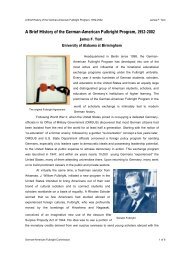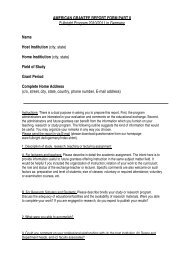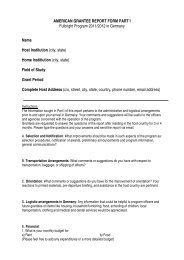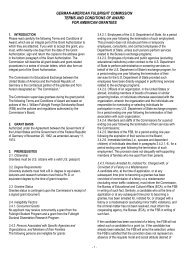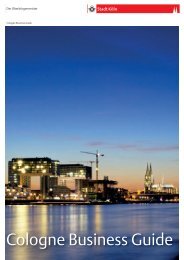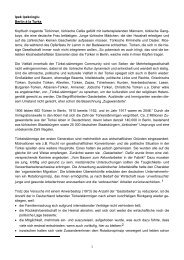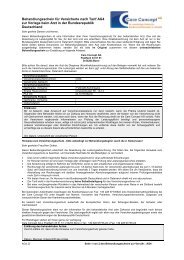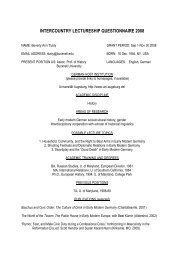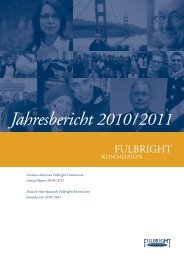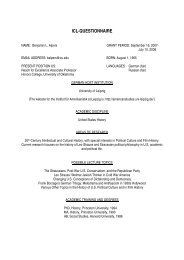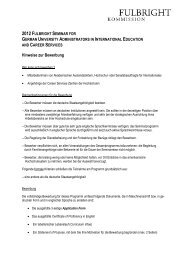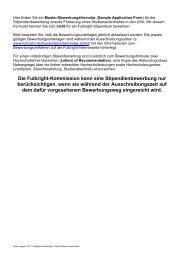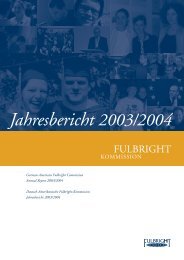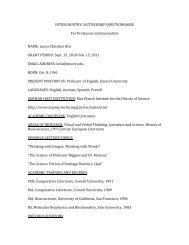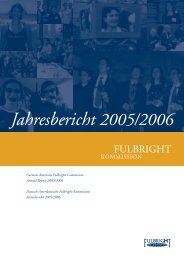Funnel 40/2, Inhalt - Fulbright-Kommission
Funnel 40/2, Inhalt - Fulbright-Kommission
Funnel 40/2, Inhalt - Fulbright-Kommission
You also want an ePaper? Increase the reach of your titles
YUMPU automatically turns print PDFs into web optimized ePapers that Google loves.
“ Hauptstadt Berlin” Seminar<br />
Berlin is a big city to cover in four<br />
days, even if you plan on concentrating<br />
on just one aspect of it. Still,<br />
this was the goal of the “Hauptstadt Berlin”<br />
Seminar 2004: to introduce a group of <strong>Fulbright</strong><br />
American grantees, primarily from<br />
the Young Journalists Program, to the<br />
political scene in Germany’s capital city.<br />
The seminar, which ran January 11-14,<br />
2004, gave eleven grantees the opportunity<br />
to learn about the people, institutions,<br />
and issues important to politics in Berlin.<br />
Over the four-day seminar, participants<br />
became better acquainted with different<br />
aspects of the German government.<br />
On Monday, they visited the Federal<br />
Chancellery (Bundeskanzleramt) and discussed<br />
German-American relations with<br />
Dirk Brengelmann, Head of the Division<br />
on North America at the Federal Chancellery.<br />
This topic was continued during a<br />
discussion with Member of Parliament<br />
Hans-Ulrich Klose. Mr. Klose “articulated<br />
well the German reasons for their stance<br />
against the Iraq war and gave candid<br />
responses to our questions,” summarized<br />
participant Nicole Harkin. Beyond German-American<br />
relations, German-German<br />
relations were also examined during a visit<br />
to the Federal Commissioner for the<br />
Records of the State Security Service of the<br />
former German Democratic Republic,<br />
where Commissioner Marianne Birthler<br />
explained the role the archives continue to<br />
play in the reconciliation process following<br />
the collapse of East Germany and the subsequent<br />
reunification.<br />
To gain a better understanding of how<br />
interest groups interact with the govern-<br />
A crash course in German politics<br />
ment in Germany, the group visited a collection<br />
of organizations where they not only<br />
learned more about current issues, but also<br />
heard how each of the groups interacts with<br />
the German government. On each of their<br />
agendas was the need for reform of the social<br />
security system. Participants met with representatives<br />
from labor unions, employers,<br />
insurers, and other organizations with a<br />
stake in the ongoing debate. Margret<br />
Moenig-Raane, Vice-Chairperson of the<br />
United Services Union (ver.di), discussed<br />
how labor unions, which traditionally have<br />
had significant influence in German politics,<br />
are having to adapt to meet the changing<br />
social and economic conditions. The<br />
group also met with representatives from<br />
the Confederation of German Employers’<br />
Associations (BDA) and the BfA (federal<br />
insurance provider for employees) to get<br />
their views on the debate. Peter Clever, a<br />
representative of the BDA, perhaps summarized<br />
the problem best when he said,<br />
“everyone talks about how to distribute the<br />
money, but what we need to talk about is<br />
where the money will come from.”<br />
NEWS & EVENTS 23<br />
<strong>Fulbright</strong>ers, however, didn’t just observe<br />
the political process from the inside.<br />
The group visited the ARD television studios<br />
and held discussions with journalists<br />
such as Alumnus Stefan Elfenbein and with<br />
Rainer Hastergs, Administrative Director<br />
of the RIAS (Radio in the American Sector)<br />
Commission. Talk focused on the<br />
media and the role they play in explaining<br />
and sometimes influencing the political<br />
process. On Monday, participants attended<br />
a federal press conference, which Harkin<br />
described as turning “the standard American<br />
press conference model on its head.”<br />
In Germany, the Bundespressekonferenz,<br />
an association of journalists, invites the<br />
speakers to its press conferences instead of<br />
the other way around.<br />
The whirlwind seminar ended on<br />
Wednesday with a farewell dinner at the<br />
Ossena restaurant. There was a lot to digest,<br />
not just great Italian food, but also the heavy<br />
German political fare that had been dished<br />
up over the last four days. The conversation<br />
and discussion of what had been heard and<br />
experienced carried on well into the evening.<br />
THE FUNNEL • VOLUME <strong>40</strong> • NUMBER 2 • SUMMER 2004



